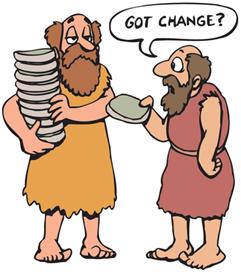Common Sense
 Like speed in football, you can’t teach common sense.
Like speed in football, you can’t teach common sense.
“The Greatest Generation,” that Tom Brokaw refers to in his book, grew up in the Great Depression and fought World War II. They had little education and tons of common sense. These people sent their children to college, often with less than a high school education themselves.
It seems we have gotten away from using that which we were born with and are attempting to substitute knowledge for knowhow.
For the record, I not only think higher education is great, but also a necessity in today’s employment climate. Reminds me of a story . . .
The first civilian police force my son joined required a college education for all police officers. According to the Captain, part of the reason it was required was to get policemen with a higher maturity level and ones who demonstrated the ability to start and complete something.
But you can’t teach common sense. For example, if you were a parking checker (Meter Maid), would you ticket a hearse in a no parking zone during a funeral? Such was the case yesterday in Milwaukee. (Read Here)
Common sense has taken a back seat. We all have it but it’s being used less frequently.
Common sense has gotten edged out by our conditioned notion that others know better because they are more learned than we. These are the people who argue which college is better. Here’s the rub: Harvard and (insert your community college here) both graduate educated morons – ones who forget they have common sense.
There is a candidate for the U.S. Senate who has fudged her educational credentials. In this age of fact checking and a 24/7 news cycle, it appears she didn’t use her common sense when padding her educational resume.
Often, we want to appear to be who we are not. We add layers and layers to ourselves in order to impress others. My mother and father, part of the greatest generation, never had a problem saying what they did. My father said, “I’m a bricklayer” and my mother said, “I’m a waitress” and they said it with pride and no sense of being less than.
Common sense will never have you feel inferior; only a conditioned sense can do that.
I would recommend that you get all the education you can afford, but less than you need to forget that you have common sense.
All the best,
John
LOSE WEIGHT & KEEP IT OFF
STOP SMOKING FOREVER
SLEEP THROUGH THE NIGHT EVERY NIGHT
IMPROVE YOUR SELF CONFIDENCE
I LOVE MY BODY
RELAX IN 2 MINUTES
FEEL FOREVER YOUNG
VIRTUAL MASSAGE
Be Sociable, Share!

 What we want is often counterbalanced by what we don’t want. As long as the dichotomy exists, we are at the mercy of the middle.
What we want is often counterbalanced by what we don’t want. As long as the dichotomy exists, we are at the mercy of the middle. A.S.K. is an acronym I came up with years ago that capsulizes the biblical guidepost that reads,
A.S.K. is an acronym I came up with years ago that capsulizes the biblical guidepost that reads,  I was not a big fan of
I was not a big fan of  “It’s tough to help someone if you think they need fixing.” So said
“It’s tough to help someone if you think they need fixing.” So said  One of the things that we humans spend the most time doing doesn’t matter – thinking!
One of the things that we humans spend the most time doing doesn’t matter – thinking! “You can’t live on leftovers” opined
“You can’t live on leftovers” opined  What’s expected of you?
What’s expected of you?
 I don’t have any statistics to back this up, but my guess is that low information voters make up about 85 to 90% of the electorate.
I don’t have any statistics to back this up, but my guess is that low information voters make up about 85 to 90% of the electorate.